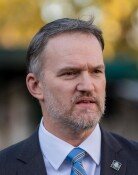Next year’s 657 trillion won budget passed belatedly
Next year’s 657 trillion won budget passed belatedly
Posted December. 22, 2023 08:33,
Updated December. 22, 2023 08:33
The National Assembly held a plenary session on Thursday and passed a budget bill of 656.6 trillion won for 2024, surpassing the statutory due date, which arrived on Dec. 2, by 19 days due to an extreme division between the ruling and opposition parties. When the Democratic Party of Korea showed an intent to unilaterally pass a bill by adjusting the government’s budget plan, the People Power Party and the government hurriedly negotiated with the main opposition party. They narrowly averted last year's ignominy of approving a belated budget bill, which was passed 22 days overdue. Nevertheless, it is open to criticism that budget approval has persistently faced delays for three consecutive years, leaving citizens uninformed about the compromises made during the process.
The finalized budget proposal underwent adjustments, resulting in a total reduction of 300 billion won. This involved a cut of 4.2 trillion won from the government’s initial proposal, and an increase of 3.9 trillion won as per the requests of the ruling and opposition parties. Specifically, the R&D budget, initially reduced by 5.2 trillion won in the government’s proposal to address concerns about tokenistic budget allocation, saw a modest increase of 600 billion won. The bipartisan compromise reinstated the budget for the atomic power plant, amounting to 181.4 billion won, and the regional currency budget of 300 billion won. The Saemangeum-related budget saw a boost of 300 billion won as well.
The budget growth rate for the upcoming fiscal year reached its lowest point since 2005, acting as a restraint on the escalation of budget size and sovereign debt, which has been on an upward trend ever since the Covid-19 pandemic. However, in the eleventh-hour negotiation, both the ruling and opposition parties established an unconventional subcommittee devoid of any formal standing within the National Assembly or the recording of minutes, through which they clandestinely brokered deals. The fiscal blueprint for the world’s tenth-largest economy was effectively shaped behind closed doors, with only a select minority from the leadership of the ruling and opposition parties and civil servants involved in the decision-making process.
Reports indicate that during the process, the budget for the hydrogen tram line in Ulsan City, the constituency of former PPP leader Kim Gi-hyeon, experienced an increase. Additionally, the budget for road establishment in Gyeyang-gu, Incheon, the constituency of Democratic Party leader Lee Jae-myung, saw a rise by a few billion won. While acknowledging the inevitability of negotiation and compromise, it is crucial to address the practice of influential politicians allocating budgetary resources solely to their constituencies.
Despite the persistent trend of delayed budget approvals and covert negotiations, the political establishment remains hesitant to confront this practice. If negotiations involving only a limited subset of decision-makers are unavoidable, it is crucial to mandate the meticulous recording of proceedings and ensure transparent disclosure to the public. Citizens have the right to be informed about the allocation of their taxes within the budget and the bipartisan negotiations that shape it.







